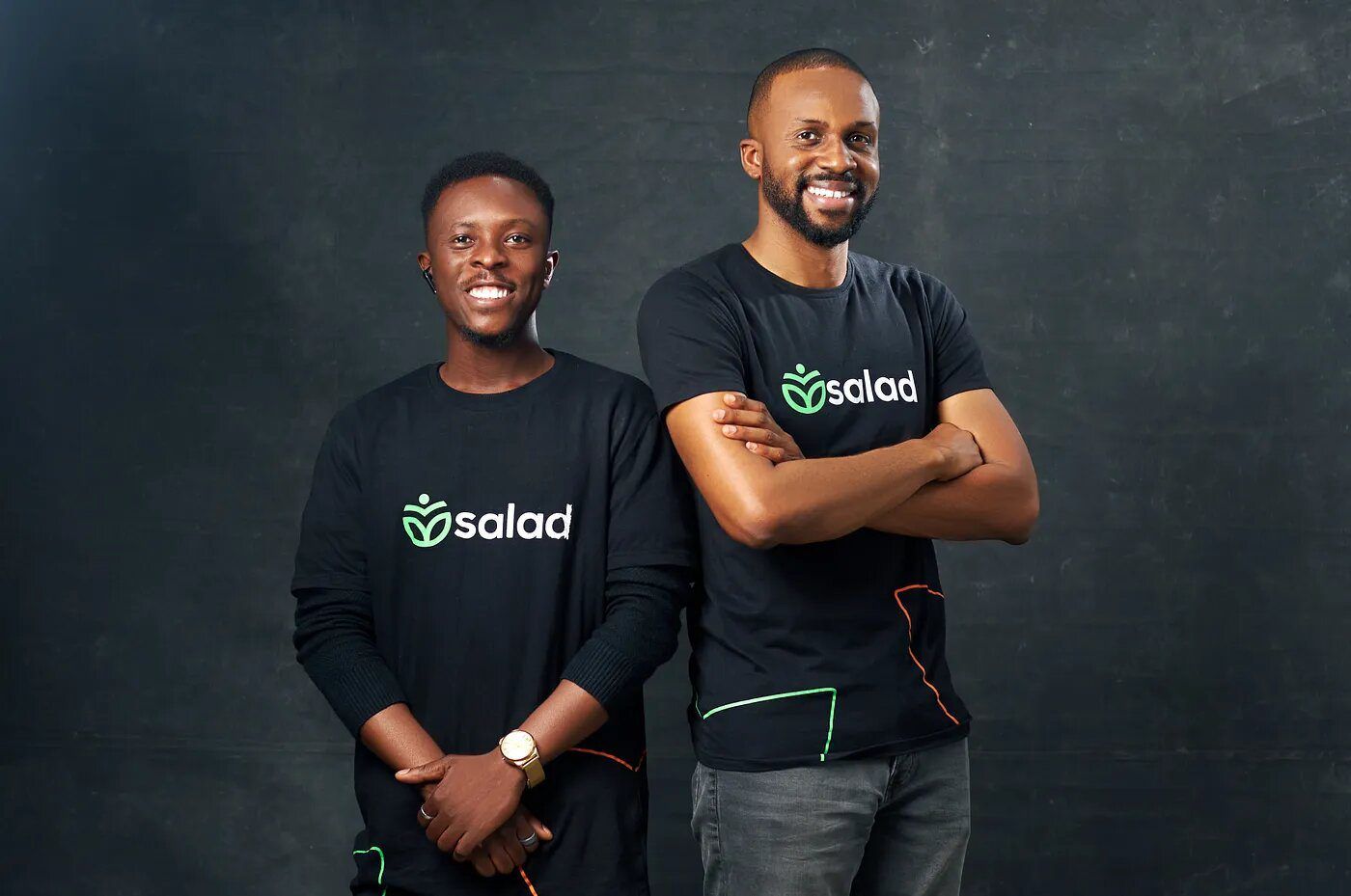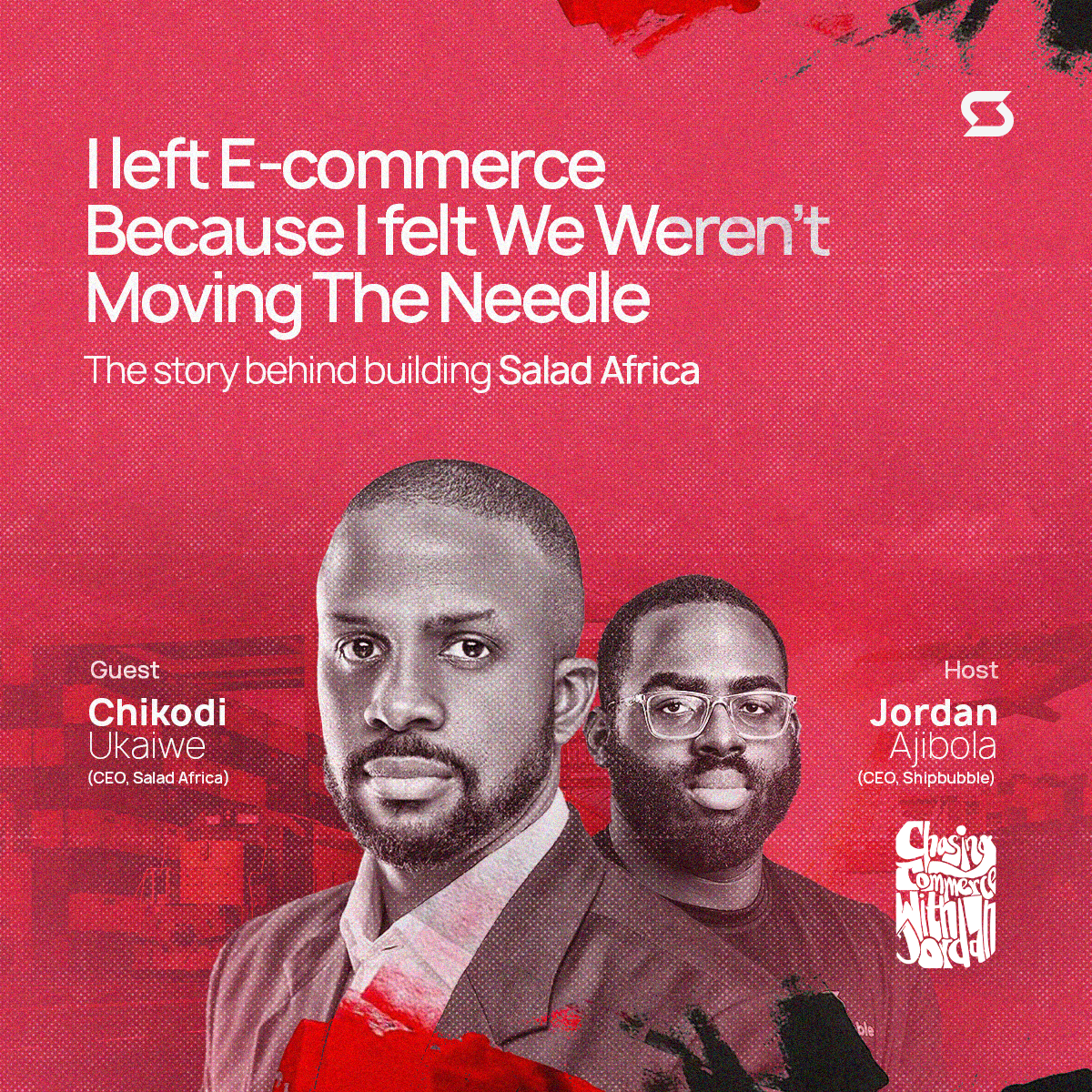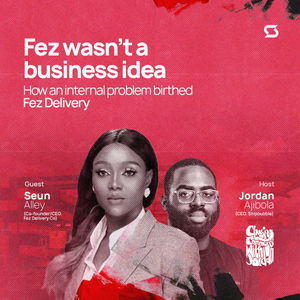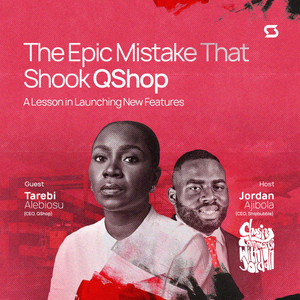"Chasing Commerce With Jordan" is a monthly interview series featuring the CEO of Shipbubble engaging in discussions with industry leaders. In this episode, Jordan sits down for a conversation with Chikodi Ukaiwe, the CEO of Salad, diving into the current trends, obstacles, and prospects in the realm of commerce and beyond.
Jordan Ajibola: Hi Chikodi, it feels so good to have this chat with you. Do you mind doing an introduction of yourself?
Chikodi Ukaiwe: My name is Chikodi Oluwasegun Ukaiwe. I’m from an inter-tribal home. Why is the information important? It very quickly made me understand that I wasn't the typical person and that I wasn’t operating within a box. This foundation sets the tone for me for the foreseeable future.
I graduated from Babcock University at 19, and I ended up having very famous classmates like Shola and Ezra of Paystack, Kayode Adeyinka of Gigmile, and Chioma of Payhippo. A lot of us in that set launched great stuff in the technology space. When I left school in 2006, there were three predominant industries; Banking, Oil and Gas, and Telecoms. When I went to university, I wanted to study Chemical Engineering but my mother insisted I read Computer Science. I did not understand why, but my mother had foresight. In 2002, no one used code for anything, and I wanted money, so I wanted to work in a bank.
I started working at Bank PHB after university, and I was drafted to the technology department, which is what people call fintech now. We were the most innovative bank at the time, pushing card payments and ATMs. The innovation then was to get people to get cards, put the cards in a machine, and get cash out. It was like magic. That’s where I started in fintech.
I did that for a while, and just like everybody else, when you want a promotion in the bank, you either switch banks or further your education. I chose the latter and went back to university to get a master's in Managing Information Technology.
In 2012, I came back to the bank, hoping for a promotion. The man who was attending to me took my CV and wanted to throw it back to me. However, due to how glossy and polished the table was, my CV slipped off and fell to the floor. I saw all of my academic achievements on the floor. Two things happened that day: I realised that the big banks needed to be disrupted and that no one organisation should have this much power. Secondly, I knew that going by conventional education wasn’t going to get me where I wanted to be.
A couple of weeks later, I got an interview with a company called Jumia. They were operating out of the house in Lekki, which was very dodgy to me at the time. I went for the interview, and I was the best-dressed person there. It was on Tuesday or Wednesday, and people wore shorts. I told myself this place was going to close down in the next six months. I entered there looking for their manager. He happened to be a 27-year-old guy. I got an offer for a role called Partnerships, and that was my first exposure to startups and e-commerce. At that time, I just wanted to ‘chop’ their money for a couple of months and go back to negotiate with the bank, but I ended up spending 2 of my best years in Jumia.
When I came in at Jumia, we were barely doing 500 orders a day. My job was to partner with people who had existing users and then see how we could trade Jumia services for those users. For example, we were supposed to talk to brands like Glo and MTN, which had millions of users who had mobile phones, and see how we could get them to shop on Jumia. After a couple of months, we realised that the European model of commerce, or the Amazon style, was not going to work in Nigeria.
We came up with something called J-Force. J-force was a group of people who had tabs, had data, and then went to the streets to physically engage people and place orders on Jumia. I started J-force with two universities. I and 3 models would go to events with a laptop, place orders, give free coupons, and delivery was free then. Before I left that team, J-force had grown to maybe 400 or 600 sales agents across Nigeria. Today, I think there are over 10,000 people.
60% of Jumia’s GMV came from my team, so I was a pretty important guy across the Jumia group. Other African countries wanted to replicate the model, and I was the guy to help them set it up. Everybody tried to keep me in that J-Force bubble, but I wanted to do more. I spoke to Sim Shagaya, who was the CEO of Konga. He sat me down, and he sold me a future where we are building an ecosystem that supports SMEs to be able to trade online, create jobs, and help the African economy, and that was my life's mission. It was a no-brainer for me, so I switched over to Konga.
At Konga, I had a free role. My role was to create new businesses because we found out that in E-Commerce, buying and selling just brings people to the party. That's not how you monetise. You bring people, you buy stuff at your selling price, and then in between you have other costs. By the time you calculate your net margin, you haven't made much. So that wasn't going to be our cash cow. Our cash cow was going to be other things we could do, like build out our own logistics system, software, adverts, and ecosystem, and that was my role. I enjoyed it. Some of the stuff I got involved with was Kongapay, Konga Express, and more. I spent a total of 4 years, and they were amazing years of my life. In those years, I led about 15 departments except technology.
After four years, I took a break in 2018. I'll be honest with you; I did that because I didn’t think what we were doing was moving the needle. We had gone through millions of dollars, and I felt like we had not made a big dent in either the shopping habits of Africans or the lives of these SMEs. Fast forward to today, and I believe I have found my space.
You need to enable businesses with finance, and you need to enable their people. Businesses need good people, good access to credit and finance, and other support to grow. That’s Salad’s life mission; enable SMEs and enable people. If you enable the life of one employee, statistics say that you are affecting the lives of four Africans because one employee is responsible for about three to four Africans. If you can affect the life of one SME, you are tentatively affecting the life of a potential 30+ Africans.Some of the products we have built so far revolve around enabling businesses with credit through invoice financing, payroll financing, and access to tools to better manage their people.
Jordan Ajibola: Amazing. I think that's a very detailed introduction. Thank you so much for that. But I have a lot of questions. I'm very curious about your experience. You worked with two of the biggest and earliest e-commerce platforms. From your own experience, what changes would you say you see now in the E-Commerce ecosystem that was created by COVID-19?
Chikodi Ukaiwe: My first taste of e-commerce in Nigeria was Dealdey; this was in 2011. I studied abroad, so shopping online was not new to me, but coming back and doing it in Nigeria was new. We didn’t have online banking, and ATM banking wasn’t predominant. Getting people to trust and use the ATMs was huge. Now, trusting them to use the same card on a system belonging to people they never met was even bigger. The innovators at that time took a copy-and-paste model of what happens in developed countries and tried to replicate it here. It didn’t work.
So what they did, which I consider one of the biggest mistakes that negatively affected the growth of the sector, was to incentivize adoption. They associated e-commerce with discounts. What that did for the Nigerian populace was make people think, ‘Why are these people trying so hard to get me to buy stuff?’ It was so bad that everybody knew the e-commerce sector was making a loss. And I think, to date, e-commerce businesses are suffering from the precedence that was set by the early players. It immediately created mistrust because, if you are indeed providing value, why are you selling your product below the selling price? It also created an enmity between the e-commerce platforms and the brick-and-mortar vendors, who were doing the right thing; buy at a price, mark up, sell, and make a profit. The moment the discounts stopped, sales stopped.
Over the years, e-commerce businesses have understood that Nigerians are a concierge type of people. It is ingrained in us. We are surrounded by drivers, nannies, help, etc. We are flooded with service. Unlike abroad, you can't find somebody who helps you go to the market. This is what brought about the growth of Instagram vendors. Nigerian buyers can interact with the seller before buying. You don’t get that from Amazon.
People are now beginning to build around the user. They are not trying to feed them user templates, but they understand what they want and how they want it, and then they build. That's why there have been a lot of successes in the e-commerce sector today.
Jordan Ajibola: Interesting point of view! But if you look at the guys abroad, before the likes of Amazon, I believe there was this time when, for people to order online, it wasn't necessarily the internet. It was that they could call and place an order because e-commerce is also anything ‘E’. Is it necessary for business owners to start there before activating the Amazon model?
Chikodi Ukaiwe: There is a video on YouTube of Sim Shagaya. He gave a detailed breakdown of the evolution of e-commerce starting with using books through trains to place orders and then waiting till the train came back around to deliver.
The journey of commerce from using trains to place orders to postal services has already helped break down the trust barrier for e-commerce to thrive abroad. A mailman delivering your mail and no one tampering with that mail till you pick it up helped establish trust in the sector. Unlike in Nigeria where many of us did not witness NIPOST work, deliveries were foreign.
Both Jumia and Konga spent hard-earned dollars on educating users and building trust. We were educating people on 3 things; trusting online payments, switching to shopping online instead of going to physical stores, and lastly, deliveries. These were three foreign things we had to sell at once, and that is why the Nigerian market was much harder to crack than the other markets.
So to answer your question, yes, one has to educate and build trust gradually before activating the Amazon model. The success that companies like Paystack enjoy now comes from the dollars Jumia and Konga had to spend on educating users and building trust. That is why people can now easily go to a website and put in their card details.
Jordan Ajibola: Yeah. I agree with that. I think Jumia and Konga did the e-commerce market a big favour. They had to lay that precedence for us to be where we are today. So, moving more into now, Salad, what do you do now in terms of financing individuals and businesses? Tell us more about that.
Chikodi Ukaiwe: There’s a big problem on the continent, which is that there is no credit. Why is credit important? Credit gives people the flexibility to live healthy lives. They can spread payments, buy work tools, improve themselves, etc. Credit also provides liquidity to the market, which means that businesses can buy more, consumers can buy more, and the entire economy is flourishing because of commerce.
But why does credit not exist on this continent? We have the biggest banks, which publish profits every year, but no credit system. What is going on? The problem is data. Abroad, they have social security numbers and credit scores. With these two things, there’s access to make inferences and regulate a person’s credit history. People's behaviours are guided by those two things because you don't want to mess up your credit score. It's sort of like Uber; even if the driver doesn’t feel like saying ‘good morning’ to you, he's guided by the rating system. It is typically the same thing with credit; we don’t have that here.
That’s the essence of Salad; providing credit and other financial services to over 480 million employees in Africa to help them live better lives. For you to be able to improve the lives of these employees, you have to also support the businesses they work for.

There are three core challenges that we have identified with African businesses: Access to finance, people; find them, train them, manage them, pay them, and thirdly, operational efficiency, which is where companies like Shipbubble, which enable growth and logistics efficiency, come into play.
The number one problem, which is infrastructure, is a Nigerian problem that cannot be solved by us, so we focus on the three that are within our purview. We have started with people, giving businesses tools to hire and manage people, payroll, access to financial services, payroll financing, and more.
Jordan Ajibola: Okay, that sounds good. I think it's quite interesting because part of what Shipbubble is looking to provide for its customers in the near future is access to finance. But in partnership with banks and other loan providers. Just to confirm, do you have a licence that allows you to give out these loans?
Chikodi Ukaiwe: Yes, we are regulated. In the future, we want to significantly reduce the risk involved in giving credit because that risk is currently why interest rates are high. Reducing the risk will help the industry grow. That’s the impact we want to create. In the future, we will connect these people directly to the financial institution, guaranteeing them reduced risk. But for now, the credit is coming from our balance sheets.
Jordan Ajibola: Awesome! Looking at Salad, what are some partnerships or collaborations we should be expecting that will help drive success for the company in terms of impact?
Chikodi Ukaiwe: Fantastic question! Only 8% of Africa’s population has access to loans. Africa has 1.2 billion people. 92% of those people have never accessed a loan. African businesses need over $150 billion in credit to grow their businesses annually, but they can’t find it. 100 startups can’t fill this gap. The problem is so huge and the African tech ecosystem is so slim that I don’t believe you should have competitions; instead, you should have comrades who are fighting for the same course. This is my mindset, and it boils down to the name of the company, Salad. The lettuce by itself is just lettuce, but the moment you add a carrot, pineapple, or cucumber, it becomes a salad.
If we have a business that needs a service we can’t provide at Salad, we believe in helping them by connecting them to another company that can solve that problem, either cross-party or through partnerships.
Salad is fundamentally built on partnerships.
Jordan Ajibola: Excellent! For the last question, what would be your advice to entrepreneurs reading this interview and looking to venture into starting a business?
Chikodi Ukaiwe: My general advice to entrepreneurs is two things: empathy and humility. Going into entrepreneurship, you have to understand that you are a servant leader. You need to embrace humility, as though you don’t know what problem you are trying to solve. Most people go into business thinking they are experts in the subject because it will help you better understand what you are up against. Take your time and talk to your users; have genuine empathy for their problems.
For e-commerce entrepreneurs in Nigeria, do not have a disdain for offline business. Find a way to run some sort of hybrid business system. Sometimes, people want to feel your business. As much as possible, try to avoid self-warehousing and acquiring business assets. This is 2023; there is distributed warehousing, Shipbubble for logistics operations, and more; you don’t have to build all these things yourself. Focus on your core, which is supply chain management. Don’t let anyone convince you that a market size is too small. Never be satisfied. Keep pushing for growth.
Jordan Ajibola: Thanks a lot, Chikodi! This was a fantastic interview, and I learned a lot. Thank you for taking the time to share this knowledge with us.
Chikodi Ukaiwe: Alright, that was fun. Thanks for having me.
Jordan Ajibola: Take care.
Thank you for joining us in this insightful conversation! If you found this discussion engaging and informative, don't forget to connect with us on social media to stay updated on more exciting interviews, industry insights, and valuable content. Feel free to subscribe to our monthly newsletter and join our community of Bubblin’ Entrepreneurs. Your feedback and engagement are highly appreciated!





